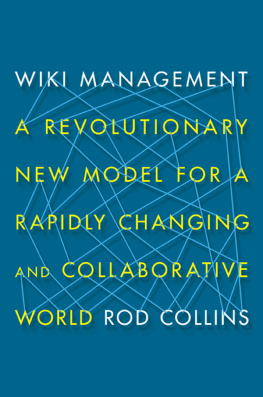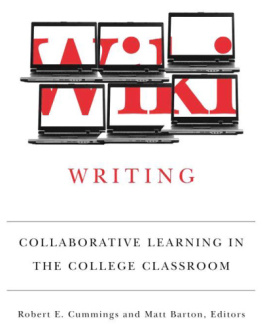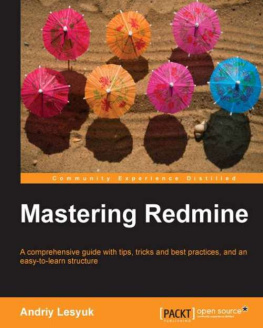ROD COLLINS is the Director of Innovation at Optimity Advisors, a national management consulting firm, and a leading expert on the next generation of business management. He lives in Aurora, Colorado.
Acknowledgments
In many ways, writing a book is analogous to running a marathon. Each is a quest that requires diligent preparation, a healthy sense of self-discipline, and support from many people during the actual journey. Marathons would be lonely endeavors without the companionship of fellow runners, the encouragement of the event volunteers, and the cheers from many spectators along the way. The same has been true in writing this book. I have had the privilege of sharing this adventure with many remarkable people, some through their constant presence, others through our work together, and still others through the wisdom of their written words. However our paths have crossed, I am deeply indebted to all of them for their ideas and contributions.
I am particularly grateful to all my many friends and colleagues in the Blue Cross and Blue Shield organizations throughout the United States for their commitment and dedication in serving the millions of customers in the Federal Employee Program. Though there is not enough space to acknowledge each of them individually, I am forever enriched because they are the ones who first showed me the incredible power of collective intelligence and taught me that nobody is smarter than everybody.
I would like to give special thanks to my colleagues at Optimity Advisors for their constant support, especially Rick McNabb, whose passion for innovation and commitment to the power of collaboration made this book possible.
Many thanks to the following people for investing hours in reading parts of the manuscript, discussing its underlying principles, providing feedback, and helping me think more clearly about the concepts and the practices in this book: Anne Murray Allen, Roger Allen, Sanjiv Augustine, Virginia Avrutin, John Balkcom, Rose Marie Barbeau, Bill Barberg, Bill Beausay, Dave Block, Amber Bray, Dennis Carrai, Larry Cooper, Shane Cragun, Rob Creekmore, Stephen Denning, Kelly Dwight, Toby Gallegos, Glenna Gerard, Lester Jenkins, Dawna Jones, Seth Kahan, Lisa Kimball, Henri Lipmanowicz, Wendy Mack, Mike Mazza, Keith McCandless, Reed Meyer, Dan Montgomery, Stephanie Nestlerode, Aaron Ninness, Tom Ninness, Jeanette Nyden, Jim Parker, Fred Plumb, Don Prentice, Lew Rhodes, Ed Smith, Michael Spayd, Peter Stevens, Kevin Stoffel, John Stypulkoski, Bob Tobias, Mary Walewski, Dave Weaver, and Robert White.
I am also indebted to the many intellectual pioneers whose writings have opened me to the innovative ways of thinking and acting that are hastening the arrival of the wiki world: Ken Auletta, Rod A. Beckstrom, Josh Bernoff, Ori Brafman, John Seely Brown, Steven Cabana, James Champy, Ram Charan, Clayton Christensen, Jim Collins, Sean Covey, Lang Davison, Thomas L. Friedman, John Hagel III, Gary Hamel, Michael Hammer, Dee Hock, Jeff Howe, Tony Hsieh, Jim Huling, Jeff Jarvis, A. G. Lafley, Polly LaBarre, Steven Levy, Charlene Li, Andrew Lih, John Mackey, Chris McChesney, Peter Miller, Melanie Mitchell, Richard Ogle, Harrison Owen, Ronald E. Purser, Eric Raymond, Fred Reichheld, Peter M. Senge, Raj Sisodia, James Surowiecki, Don Tapscott, William C. Taylor, Margaret J. Wheatley, and Anthony D. Williams.
I would like to express special appreciation to my agent, Sandra Bond, who has enthusiastically believed in the message of this book and provided invaluable support and assistance. Without her passion and dedication, this book would not exist.
Kudos as well to Christina Parisi, executive editor of AMACOM Books, who provided the vision that made this a far better book than it would have otherwise been. She and her outstanding team exceeded every expectation.
Finally, I am deeply thankful to my family for their constant love, support, and inspiration. It is my great fortune to share my journey with my wife, Catherine. Her unwavering faith and encouragement has been my greatest blessing on this quest. I've learned so much about our new world and its new rules from hours of rich conversations with our daughters, Melissa and Meghan, and their spouses. I am grateful for their patience and tutoring in showing me how fast the world is changing. I am inspired by the joy and curiosity of our three wonderful grandsons, who are true children of our new wiki world. They give me hope that our best times are yet to come.
Your Goal is Success. Ours is helping you get there.
American Management Association, a world leader in professional development, has helped millions of people learn new skills, improve performance and work through challenges. Our flexible training solutions fit every stage of your career and the demands of your schedule.
Need the skills to get ahead fast?
AMA offers 140+ seminars in more than 40 cities nationwide. Tackle challenges directly related to your job in these dynamic classroom courses led by our expert facultywith superior content, hands-on training and peer interaction.
Can't get away from work for training? Train right at your desktop.
AMA's Live Online Seminars offer instructor-led, interactive courses with the high-quality content and expert faculty you expect from AMA. No need for travel or time away from the office.
Tight schedule? Choose where and when you learn.
AMA OnDemandTM is online training powered by CrossKnowledge that gives you the freedom to build new skills 24/7 as well as feedback and support from a professional coach. You will be awarded an AMA Certificate upon completion.
Facing a tough business challenge?
AMA EnterpriseSM can help with both the diagnosis and solution. This specialized division works with corporations and government agencies to drive talent transformation and organizational excellence.
Increase your knowledge even more with AMA Webinars, AMACOM business books and an extensive range of FREE resources including webcasts, podcasts, eNewsletters, articles and White Papers.
Learn more at www.amanet.org/goal |
 American Management American Management
Association | DEVELOPMENT SUPPORT SOLUTIONS | www.amanet.org |













 American Management
American Management